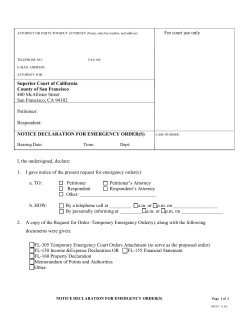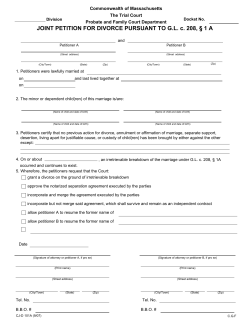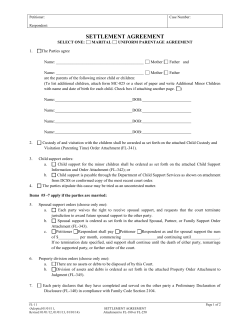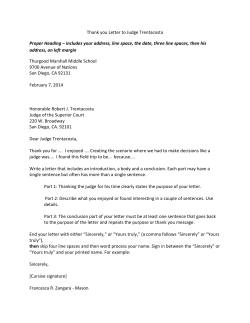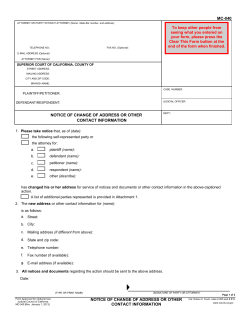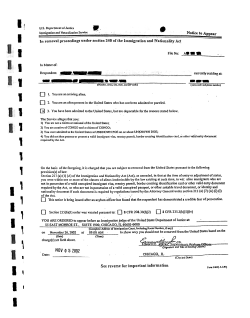
O The Struggle to Bring Justice to Giamelli,
April–May 2008 The Struggle to Bring Justice to CDP Cases Continues: Giamelli, and Why the Tax Court Is Wrong By William E. Taggart, Jr. William E. Taggart, Jr., examines Giamelli and the Tax Court’s continuing struggle to define its role in appeals of CDP cases. O n October 30, 2007, the U.S. Tax Court released its opinion in J. Giamelli.1 Giamelli illustrates in dramatic fashion the Tax Court’s continuing struggle to define its role in appeals of determinations in Collection Due Process (CDP) cases. The case also illustrates the wide range of views regarding CDP cases among the judges on the Tax Court. The decision of the majority of the court in Giamelli is correct, but its reasoning is flawed.2 A majority of the judges g correctly concluded the court should not consider the issues raised byy the successor to the interests si der th he iis the original Petitioner—but off th he orig o igii Petit oner— —but for the wrong reason. Giamelli, original JJoseph ossep ph h Gia G melli, the o rigina Petitioner, was killed in after a settlement of his n an aut aautomobile accident d collection dispute te in n the pending pend n ngg CDP C CD case case had h been b been negotiated, but be before settlement agreement was re tthe he se ettlemen agr eemen w a signed. As a consequence of the death of the original Petitioner, all issues in the pending case, which was solely a collection case, became moot. The denial of relief in the deceased Petitioner’s CDP hearing ceased to have significance. With the death of Petitioner, no justiciable issue remained pending before the court. The opinion of the majority of the Tax Court judges is instructive, but it is wholly dicta. As a consequence of the death of Petitioner, the dispute before the court ceased to exist3 because it ended any dispute over the proposed collection action against the decedent. William E. Taggart, Jr., is Dean Emeritus of the Golden Gate University School of Law LL.M. Program in Taxation, and a Principal in the law firm of Taggart & Hawkins with offices in San Francisco and Oakland, California. He wishes to thank his partner, Karen L. Hawkins, for her valuable input on this article © JOURNAL OF TAX PRACTICE & PROCEDURE The multiple opinions expressed in the concurring and dissenting opinions in Giamelli are useful as guides to the views of various judges regarding CDP cases. These opinions are informative, but like the majority opinion, these opinions are dicta. The concurring and dissenting opinions are also instructive as descriptions of the issues in CDP cases with which the Tax Court is struggling, and will continue to struggle. The problem with dicta is that it can take on (and often does) a life of its own. In its efforts to be helpful to the predominant pro se audience before it, the Tax Court expands its opinions beyond necessity, resulting in dicta, far too often. As a practitioner, I encounter this enco ounter th ou is in the form of IRS counsel’s citation to Tax Court Tax C ourt dicta diccta as “law” and support for a particular position. I have already experienced this “dicta reliance” on Giamelli with respect to three other CDP cases I am handling when the government wishes to take the position that the Tax Court has no jurisdiction over a specific CDP fact pattern. Factual Background Petitioner and his wife filed a joint income tax return for 2001 which reflected a substantial income tax liability. The tax liability was not paid with the filing of the return. Respondent commenced collection action. Petitioner requested a CDP hearing—purportedly for the purpose of negotiating an installment payment arrangement. It is unclear from the opinion whether the wife of Petitioner joined in the request for a CDP hearing. 2008 W.E. Taggart 23 The Struggle to Bring Justice to CDP Cases Continues Petitioner and Respondent negotiated for a period of time without agreeing on an installment payment arrangement. Respondent eventually issued a Notice of Determination because Petitioner was not in compliance for tax periods subsequent to 2001. Petitioner appealed Respondent’s determination to the Tax Court. While the appeal was pending, Petitioner and Respondent agreed upon an installment payment arrangement. Petitioner was unfortunately killed in an automobile accident before the installment payment agreement was signed. Petitioner’s wife was appointed Executrix of Petitioner’s Estate. Respondent was informed of the appointment. Respondent moved for dismissal of the case for lack of prosecution on account of the failure to substitute the Executrix of the Estate for the Petitioner. In the alternative, Respondent moved for summary judgment on the ground there was no evidence Respondent had abused his discretion in denying relief to Petitioner in the CDP hearing. Before Respondent’s motions were heard, the surviving spouse, as Executrix, moved to be substituted for Petitioner in the pending case. The Executrix also sought to contest the underlying tax liability on the ground the tax liability was caused by the failure of Petitioner to claim deductions for bribes that he had paid in 2001. The estate argued that it should be allowed to show that the tax liabilityy had been overstated in th he 2001 2 200 01 income i order Petitioner’s orrde der to to conceal ccon eal Pe titioner’s illegal ille activities. The Th he cou ccourt urtt aallowed owed the ssurviving urvivin spouse, as Executrix, to for o bee substituted su ubs f Petitioner. The court then granted Respondent’s motion forr summary ot on fo summaary y judgment dgment on n aacccount of the failure lur of Executrix Execu utrix to to present p ese ent eevidence videnc that Respondent had abused his discretion in denying relief to Petitioner from the proposed collection action. The decision was correct, but the reasoning was not because the case before the court was moot.4 The court struggles unnecessarily in its opinion in Giamelli with the question of whether the surviving spouse, acting as Executrix of the original Petitioner’s estate, could raise issues in the appeal that had not been raised at the CDP hearing. The majority of the court concluded that a new issue with respect to the underlying liability could not be raised in a case in which Respondent’s decision in the CDP hearing addressed only Respondent’s collection action. Majority Opinion The court in Giamelli unnecessarily allowed the issue with which it struggled to be raised. The court should not have allowed the estate to be substituted for Pe- 24 titioner for any purpose except dismissal for lack of subject matter jurisdiction. Respondent led the court into this error by seeking summary judgment on the merits as an alternative to dismissal for the failure to substitute the representative of the estate for Petitioner. If Respondent had moved for dismissal on the ground the matter before the court was moot, the court would not have struggled with its decision in Giamelli. The failure of the parties to properly present the issues to the court undoubtedly misled the court. However, the court should have recognized that the matter before it had become moot. The court should have recognized that it lacked subject matter jurisdiction as a consequence of the death of the Petitioner. The estate, as the successor in interest to the debts of Petitioner, was the proper party to replace Petitioner in the matter before the court, but the estate was not the taxpayer against whom collection action had been initiated. The case before the court was an appeal of a decision denying relief to a deceased taxpayer from a proposed collection action. The estate was the successor in interest to the debts of the deceased taxpayer, but the estate was not the taxpayer. Respondent had not proposed collection action with respect to the estate. Unless and until Respondent filed a claim against the estate in the probate action, it could not proceed to collect against the estate. All issues relating to Respondent’s collection action against the deceased taxpayer were rendered moot by the taxpayer’s death. That the tax liability in issue was a joint income tax liability is irrelevant. On the facts found by the court, the surviving su rv v ng spouse, spou use as a separate taxpayer who presumably was w as jointly jo ointly liable liaab for the unpaid tax liability, was not a party to the case before the court. The surviving spouse’s rights and obligations with respect to the unpaid income tax liability were not before the court. Similarly, the rights and obligations of the deceased taxpayer’s estate with respect to the tax liability were not before the court. Of greatest significance, any action by Respondent with respect to the collection of the unpaid tax liability against either the surviving spouse, or the estate of the deceased taxpayer, was not yet ripe for review by the Tax Court. The Majority Decision, a Concurring Opinion and a Dissent Giamelli was not the proper case for the court to attempt to refine its jurisdiction over appeals in CDP cases. In Giamelli a majority of the court concluded: Previously, we have left the door open to the possibility that we might consider issues not raised April–May 2008 in the administrative hearing. See Magana v. Commissioner, 118 T.C. 488, 493 (2002) (“generally it would be anomalous and improper for us to conclude that Respondent’s Appeals Office abused its discretion under section 6330(c)(3) in failing to grant relief, or in failing to consider arguments, issues, or other matter not raised by taxpayers or not otherwise brought to the attention of Respondent’s Appeals Office” [Emphasis added.] We hold today that we do not have authority to consider section 6330(c)(2) issues that were not raised before the Appeals Office.5 The court’s opinion is unnecessary dicta. The court was trying too hard to reach a legal conclusion in a case in which the court lacked jurisdiction to make any decision except to dismiss the case because the matter before it was moot. The discussion Giamelli has generated, however, makes the case significant. Judge Wherry accurately points out in his concurring opinion6 that the majority’s decision does not expressly overrule R.B. Magana,7 even though Judge Swift believes that Giamelli closes the door left slightly ajar by Magana. Judge Wherry identifies two substantial limitations that must be placed on the majority’s j y statement that an issue must be raised at Appeals to review by the court Appeals in in order to be subject j in in an n appeal a pe of a CDP app CDP determination. determ Judge J dgee Wherry Jud W ry first Whe rst points points out ou that the record of a CDP is prepared by Respondent, and that DP P hearing hea h the record prepared Respondent may neither ar d by Re espo onde en ma y bee ne ither complete nor accurate. ccu te Judge udge Wherry’s Wherr s observation observat on is an understatement. Almost invariably the record in an appeal of a decision in a CDP case will be incomplete or inaccurate to some degree. The record is prepared by Respondent to provide support for Respondent’s determination. Judge Wherry accurately observes that it may be necessary for the court to receive evidence in order to determine the completeness or accuracy of the record. Judge Wherry also observes that all of the evidence relevant to a determination in a CDP hearing may not be readily available to Appeals. The need to allow the introduction of additional evidence with respect to an issue that was properly raised in a CDP hearing is a second limitation that Judge Wherry urges must be placed on a strict reading of the majority’s statement regarding the limitations on the court’s jurisdiction. In his dissenting opinion Judge Swift correctly observes that Giamelli is not the case that should be used to overturn Magana. Indeed, as Judge Swift JOURNAL OF TAX PRACTICE & PROCEDURE points out, there is no reason for the court to overturn Magana. Judge Swift is correct in urging that it was: ... unnecessary, inappropriate, and erroneous for us to base our holding herein [in Giamelli] on a lack of authority or jurisdiction and to eliminate the special circumstances exception of Magana ... .8 Magana may require clarification, but there is no reason to overrule Magana. There are too many instances in a CDP case in which the record is seriously deficient. As Judge Swift notes, the Tax Court’s universe of CDP cases is expanding. Giamelli is not the proper case for the court to conclude it does not have jurisdiction under Code Sec. 6330(c)(2)9 to consider issues that were not raised at Appeals. There are too many variations on, “What is an issue?” and, “What does it mean to raise an issue?” for the court to overrule Magana, or for the court to conclude it can never consider an “issue” that was not raised at Appeals. Does Appeals have to understand the issue? Is a new and different argument regarding facts and law that were presented in a CDP hearing to be treated in the same manner as an argument that depends in part on facts that were not available in the CDP hearing? Are facts that were proffered, but not considered by Appeals, the same as facts that were not proffered because they were not available at the time Appeals considered the case? Suppose the facts were available w ere ava aila able in Respondent’s records, and Respondent chose not to search for such facts, or deemed de ent cho ose e no n the facts irrelevant without searching? Dissenting Opinions of Judge Vasquez and Judge Marvel Both Judge Vasquez and Judge Marvel10 wrote dissenting opinions. Judge Vasquez’s dissenting opinion is an instructive review of the legislative environment that spawned CDP hearings, and the Tax Court’s supervision of CDP hearings. While Judge Vasquez’ dissenting opinion is informative, it is largely a cry for legislative assistance. Congress has taken the sole action that it is likely to take in the immediate future with respect to CDP cases. Congress has thrust upon the Tax Court jurisdiction over all appeals of determinations in CDP cases.11 Congress’ expansion of the Tax Court’s jurisdiction to include all CDP cases could be viewed as Congress’ approval of the Tax Court’s handling of CDP cases. 25 The Struggle to Bring Justice to CDP Cases Continues If Congress approves of the Tax Court’s handling of CDP cases, the uncertainty suggested by the diversity of the opinions in Giamelli indicates Judge Vasquez is correct in seeking legislative guidance with respect to CDP cases. Perhaps Congress should assist the Tax Court in describing more specifically what it expects the Tax Court to do, and how it expects the Tax Court to do it. However, it is unlikely Congress will provide any such guidance. Judge Marvel’s dissenting opinion focuses on the difference between the failure of a taxpayer to raise an issue in a CDP hearing that could have been raised, and the failure to raise an issue that could not have been raised. In footnote 2 of her dissenting opinion, Judge Marvel succinctly describes the most critical aspect of the factual analysis in Giamelli—the estate is a separate taxpayer that may be responsible for the payment of the debts of the deceased taxpayer, but the estate is not the taxpayer. Judge Marvel quite accurately points out that the standing of the estate to contest an unpaid tax liability after the taxpayer has died could not have been raised at the taxpayer’s CDP hearing. Essentially pointing out the obvious Judge Marvel correctly observes, “The majority’s conclusion that the issue was not timely raised makes no sense.”12 The court no longer has jurisdiction over the CDP case before it because the taxpayer ta axp payeer has h died. The dissenting Vasquez and Judge Th h d he dissse ng opinions di opinion of Judge Ju Marvel illustrate other issues that have complicated the Marvvell ill illustr us te oth er issu es tha Tax handling off CDP cases. The Tax Court has ax Court’s Court o h l always been a “peoples’ cases p opless ccourt.” o rt. IIn ou n defi eficciency ency ccas es the Tax Court has stretched as ffrequently quently st retche the e letter etter of o tthe h law to assist taxpayers who have not been treated fairly by the tax system. This attitude is reflected in the Tax Court’s procedures as well as in its decisions. The carryover of a “peoples’ court” attitude, coupled with the numerous CDP cases that have confronted the Tax Court that were nothing more than protests against the tax system, has created an almost schizophrenic aspect to some of the court’s decisions in CDP cases. In light of the recent expansion of the Tax Court’s jurisdiction through the amendment of Code Sec. 6330(d)(1), the court should carefully reconsider some of its decisions in CDP cases. Cases involving taxpayers who are protesting the tax system, cases involving taxpayers who cannot reasonably pay their tax liabilities, and cases involving taxpayers who have been unfairly treated by the collection processes of the IRS do not fully describe the universe of cases that fall within Code Sec. 6330. All federal tax disputes involving collection issues are now subject to judicial supervision by the Tax 26 Court. The federal government has a single system for the collection of most taxes, and related penalties and interest. Consequently, federal tax collection disputes for a wide variety of cases, including a wide variety of cases under Code Sec. 6330(c)(2)(B), are now subject to judicial review by the Tax Court. Because Code Sec. 6330 encompasses two distinct types of cases, the multiple opinions in Giamelli should be viewed as a dialogue that calls for the Tax Court’s careful review of its practices and procedures as well as the court’s interpretation of the law in CDP cases. CDP cases are an instance in which all of the cases cannot be wrapped in a single garment. In commenting on the statement in the majority opinion that “[w]e note that our jurisdiction pursuant to section 6330(d) differs from our jurisdiction under section 6213(e).”13 Judge Swift points out that the court’s recognition of this difference calls into question some of the court’s early decisions in CDP cases. As Judge Swift indicates in his dissenting opinion, the Tax Court has been erratic in its recognition of the differences between CDP cases and deficiency cases. For substantive cases, cases under Code Sec. 6330(c)(2)(B), the court serves its purposes well when the court grants latitude for the correction of errors in the application of the tax system to taxpayers who have not had an opportunity for judicial review of their circumstances. However, in cases in which the sole issue is the propriety of a collection action, the court will serve its purposes better by applying both to Respondent, Re po ond dent and to taxpayers, the strict rule that it espouses—the es pouses th he record of a CDP hearing must clearly establish that Respondent gave a full and fair opportunity to the taxpayer to address all issues involving the collection of tax, and that Respondent did not abuse his discretion in denying the taxpayer relief from the proposed collection action.14 In an appeal to the Tax Court of a decision in a CDP hearing, different sets of rules must apply to an appeal of a decision in a hearing raising an issue pursuant to Code Sec. 6330(c)(2)(B), as distinguished from an appeal of a decision in a hearing involving solely collection action under Code Sec. 6330(c)(2) (A). From some of the Tax Court’s earliest decisions in CDP cases, the court has recognized that there must be different sets of rules for the two types of CDP cases. However, in many of the decisions the court has rendered in CDP cases over the past eight years, the court has failed to carefully consider the nature of the particular CDP case before it as it struggled, on a largely ad hoc basis, to apply the law in CDP cases. April–May 2008 Conclusion Anyone who is interested in CDP cases should carefully read Giamelli, although the case should never be cited as controlling authority. Giamelli should be regularly considered for its guidance in the refinement of the practices and procedures applicable to CDP cases. However, Giamelli is not “reliable” law. The Tax Court should be applauded for addressing as well as it has a difficult area of jurisprudence which was thrust upon the court with little guidance. Congress created CDP hearings to the great dismay of Respondent in order to curb what Congress perceived as abuses in the collection processes. The idea for CDP hearings may have been well conceived, but the implementing legislation was not well considered. The Tax Court is stuck with CDP cases for the foreseeable future. As a consequence of the amendment of Code Sec. 6330(d)(1), it is likely the Tax Court will experience an increase in the number of CDP cases filed. It is also likely the court will experience a significant increase in the number of CDP cases that involve substantive determinations pursuant to Code Sec. 6330(c)(2)(B). The mundane collection cases under Code Sec. 6330(c)(2)(A) that have so badly muddied the CDP waters are not likely to significantly increase in numbers, although it is likely such cases will become more challenging as taxpayers, and their representatives, become more proficient in availing themselves of the CDP hearing process. The Tax Court’s views regarding CDP cases have evolved over the past eight years. In some respects the diversity of views in Giamelli illustrates that evolution. As a consequence of the amendment to Code Sec. 6330(d)(1), the evolution is likely to continue for the foreseeable future, and at an accelerated rate. ENDNOTES 1 2 3 4 5 6 7 J. Giamelli, 129 TC 107, Dec. 57,155 (2007). Judge Goeke authored the opinion of the court. Judges Cohen, Halpern, Chiechi, Foley, Thornton, Haines, Kroupa and Holmes concurred in the opinion. See, L. Greene-Thapedi, 126 TC 1, Dec. 56,401 (2006). In Greene-Thapedi the tax liability ability for which w a decision upholding a proposed p sed coll pos collection ec action was co collected ected w while the appeal app peal was w pending. en In Greene-Thapedi, ene-Tha thee so sole le iissue ssue appealed ppealed to th the e Tax C Court was Respondent’s Reespo d denial d off relieff from f his proposed collection action. on The The court u held in Greene-Thapedi that at the t collection of of the tax liability rendered moot the taxpayer’s appeal of the IRS’s proposed collection action. In footnote 6 of the majority opinion, the court misstates its holding in Greene-Thapedi. The court’s erroneous description of its opinion in Greene-Thapedi may explain the majority’s error in Giamelli. Greene-Thapedi, id. Giamelli, supra note 1, at 15. Judge Haines agreed with Judge Wherry’s concurring opinion. R.B. Magana, 118 TC 488, Dec. 54,765 8 9 10 (2002). Judges Colvin, Wells, Laro and Vasquez agreed with Judge Swift’s dissenting opinion. Code Sec. 6330(c)(2) provides: (2) ISSUES AT HEARING.— (A) In General.—The person may raise at the hearing any relevant issue relating to the unpaid tax or the proposed levy, including— (i) appropriate spousal defenses; (ii) challenges to the appropriateness of collection actions; and (iii) offers of collection alternatives, which may include d posting o of a bond, the he substitution substitutio of other assets, asse s, an installment ll agreement, or an offer-inff compromise. (B) Underlying Liability.—The person may also raise at the hearing challenges to the existence or amount of the underlying tax liability for any tax period if the person did not receive any statutory notice of deficiency for such tax liability or did not otherwise have an opportunity to dispute such tax liability. Judges Colvin, Swift, Laro and Gale agreed 11 12 13 14 with Judge Marvel’s dissenting opinion. As part of the Pension Protection Act of 2006 (P.L. 109-280), Code Sec. 6330(d)(1) was amended to read: (1) JUDICIAL REVIEW OF DETERMINATION.—The person may, within 30 days of the determination under this section, appeal such determination to the Tax Court (and the Tax Court shall have jurisdiction with respect to such matter). The Joint Committee on Taxation stated the express reason for this change was to place all appeals of determinations in CDP cases under the jurisdiction of the Tax Court. Giamelli, supra note 1, at 44. Giamelli, supra note 1, at 16. See, e.g., Judge Nimms’ decision in D.L. Samuel, 94 TCM 392, Dec. 57,141(M), TC Memo 2007-312. Judge Nimms’ thoughtful analysis of this difficult case is excellent, but his decision to remand the case is unfortunate. Judge Nimms also was far too gentle in his treatment both of a difficult taxpayer, and of the IRS’s inability to pragmatically address a difficult collection case. This article is reprinted with the publisher’s permission from the JOURNAL OF TAX PRACTICE & PROCEDURE, a bi-monthly journal published by CCH, a Wolters Kluwer business. Copying or distribution without the publisher’s permission is prohibited. To subscribe to the JOURNAL OF TAX PRACTICE & PROCEDURE or other CCH Journals please call 800-449-8114 or visit www.CCHGroup.com. All views expressed in the articles and columns are those of the author and not necessarily those of CCH. JOURNAL OF TAX PRACTICE & PROCEDURE 27
© Copyright 2025

